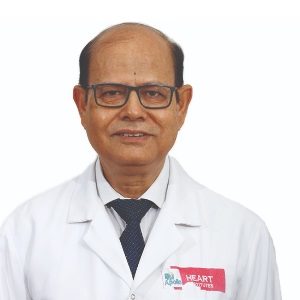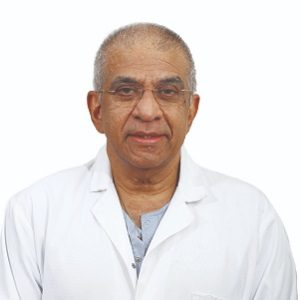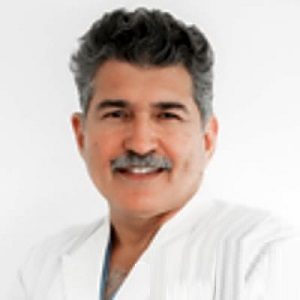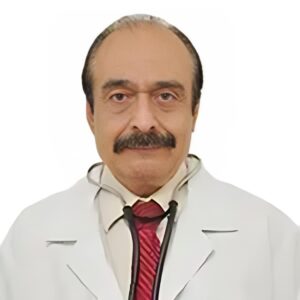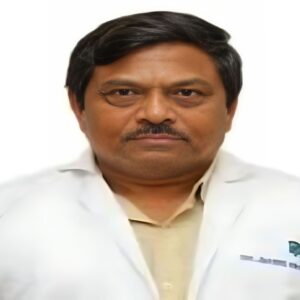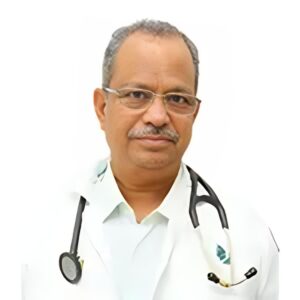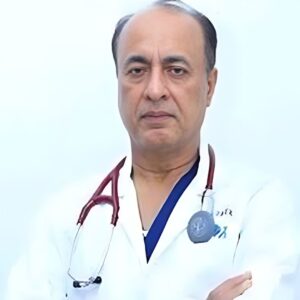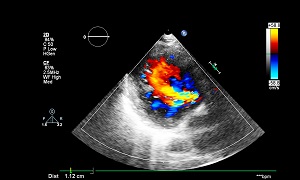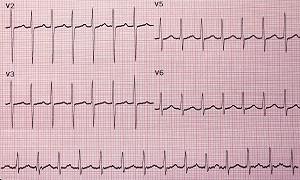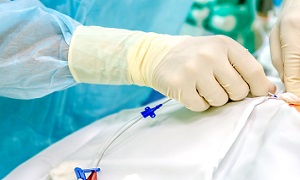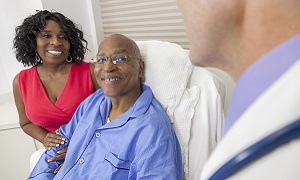Best Mitral Valve Replacement Doctors in India
Here is a list of the most reputed Cardiac Surgeons in India for Mitral Valve Replacement or repair.
- Interventional Cardiologist, Chennai, India
- Over 15 years’ experience
- Apollo Hospitals Greams Road
Profile Highlights:
- Dr. Sai Satish is a distinguished Senior Interventional Cardiologist affiliated with Apollo Hospitals in India, renowned for his pioneering contributions to the field of transcatheter valve therapies.
- His expertise extends internationally, as he also serves as a practicing interventional cardiologist and esteemed faculty member at the Gottsegen Institute of Cardiology in Budapest, Hungary, one of the world’s leading centers for TAVR (transcatheter aortic valve replacement) training.
- A trailblazer in the realm of minimally invasive cardiovascular procedures, Dr. Satish is celebrated for performing the highest number of percutaneous edge-to-edge mitral repairs (MitraClip implants) in the Indian subcontinent.
- Cardiac Surgeon, Cardiothoracic Surgeon, Vascular Surgeon, Chennai, India
- Over 35 years’ experience
- Apollo Hospitals Greams Road
Profile Highlights:
- Dr. Dillip Kumar Mishra is a well-known and experienced Cardiothoracic Surgeon in Chennai who has completed 35 years of specialized experience.
- The doctor gained experience working overseas in countries like Italy, Saudi Arabia, Bangladesh-Dhaka, and India.
- The doctor offers the best services to the patients, some of the prominent services include Intra – Arterial Thrombolysis, Mitral/Heart Valve Replacement, Cardio-Thoracic Surgery, bypass surgery, Radial Approach Angiography Balloon Mitral Valvuloplasty, etc.
- Cardiac Surgeon, Cardiothoracic Surgeon, Vascular Surgeon, Chennai, India
- Over 31 years’ experience
- Apollo Hospitals Greams Road
Profile Highlights:
- Dr. Vijay Shankar S is a senior cardio-thoracic Surgeon in Chennai having experience of more than 30 years in Cardiac Surgery.
- Dr. Vijay Shankar was a fellow Coronary Artery Surgery and Congenital Heart Surgery at the University of Wisconsin, USA.
- He provides consultation and diagnostic services for Mitral/Heart Valve Replacement, Cardiac Pacing, Invasive Cardiology, ABPM, Balloon Mitral Valvuloplasty, CT Angiography, etc.
- Cardiovascular Surgeon, Cardiac Surgeon, Gurugram, India
- Over 32 years’ experience
- Medanta-The Medicity, Gurgaon
Profile Highlights:
- Dr. Vijay Kohli is one of the best cardiac surgeons in India. He has brought an evolution in the spectra of Cardiac Surgery, wherein, he was the first leading surgeon to perform CABG on a beating heart in Kathmandu, Nepal.
- Vijay Kohli performed the first coronary artery bypass surgery in Jammu Medical College in 2001.
- Cardiologist
- Over 52 Years Experience
- Apollo Hyderabad
Profile Highlights:
- Dr. Sudhir Naik is a top cardiologist in Hyderabad and is among the most experienced doctors in the field.
- As a Senior Consultant of Cardiology at Apollo Health City, Hyderabad, Dr. Naik brings a plethora of experience to his profession.
- With an experience of over 52 years, Dr. Sudhir Naik stands as a well-renowned specialist who provides a range of treatments to address a variety of issues related to cardiology.
- Committed to providing complete cardiac care, Dr. Sudhir Naik specializes in treating ailments like chest pain, heart failure, hypertension, coronary artery disease, arrhythmia, etc.
- He is quite efficient in performing complex procedures like TAVR (Transcatheter Aortic Valve Replacement) and high-risk procedures like angioplasties.
- In addition to his clinical expertise, Dr. Sudhir Naik also stands as a prolific researcher. He has contributed to many national and international journals, demonstrating his dedication to the advancement of cardiac science.
- Cardiologist, Hyderabad, India
- Over 36 Years Experience
- Apollo Hyderabad
Profile Highlights:
- Dr. Badri Narayana Tumulu is one of the finest cardiologists in Hyderabad, with an extensive experience of over 36 years in the clinical field of Cardiology. Currently, Dr. Tumulu serves as a Senior Consultant in the department of Cardiology at Apollo Hospitals, Hyderabad.
- Dr. Tumulu’s commitment to improving cardiac care is seen by his work in cardiovascular disease management, preoperative care, and preventive measures.
- He brings forth a plethora of expertise and knowledge into his practice and treats a wide range of cardiac conditions including, Irregular Heartbeat, Dilated Cardiomyopathy, Barth Syndrome, Orthostatic Hypotension, Rheumatic Heart Disease, and much more. He also conducts multiple tests for coronary artery disease and valvular heart diseases.
- Additionally, he gives specialized treatment for chest pain that occurs during exercise, and also offers cardiac rehabilitation programmes.
- Dr. Badri Narayana Tumulu’s educational background is equally impressive as he holds various degrees such as MBBS, MD (Medicine), and DM (Cardiology). Apart from that, he is also known to contribute extensively on research papers on hypertension, women’s heart diseases, etc.
- Throughout his distinguished career, Dr. Tumulu has received several honors, such as the Mega Excellency Award (2016), the National Integration Award (2016), and the esteemed Navaratna Award (2016). In addition, he is the Founder and Chairperson of the BASE Vision Foundation (BVF), which validates his dedication to community service and high-quality healthcare.
- By maintaining his unrelenting dedication to perfection, Dr. Badri Narayana Tumulu keeps raising the bar in the field of Cardiology and making sure his patients have the best possible heart health.
- Cardiologist, Hyderabad, India
- Over 40 Years Experience
- Apollo Hyderabad
Profile Highlights:
- Dr. Venkata Rayudu Nekkanti is one of Hyderabad’s most experienced cardiologists, having been practiced for over 40 years.
- Presently practicing as a Senior Consultant in the Dept. of Cardiology at the Apollo Health City, Hyderabad, Dr. Nekkanti offers his patients with unmatched attention and care.
- He specializes in treating many cardiac disorders such as Heart Failure, Aortic Aneurysm, Hypertension, Myocardial Infarction (Heart Attack), and Coronary/Peripheral Artery Disease among several others.
- Dr. Nekkanti is also well known for his expertise in performing complicated and high-risk procedures such as Coronary Stent Implantation, Pacemaker, Implantable Cardioverter Defibrillator (ICD) implantations, and Angioplasties.
- Throughout his illustrious career, Dr. Nekkanti has received several honors, including the esteemed Govt. of Andhra Pradesh’s Best Service Award for pioneering the first Coronary Angioplasty in India.
- In addition, the Indian Academy of Echocardiography awarded him the Best Paper Award, and the Indian Society of Echo Cardiography honored him for his outstanding research on Complex Aortic Plaques in Cryptogenic Stroke in 2011.
- Due to his extensive training, kind demeanor, and commitment to promoting heart health and well-being, patients trust him and feel at ease with him.
- Cardiologist, Hyderabad, India
- Over 35 Years Experience
- Apollo Hyderabad
Profile Highlights:
- With more than 35 years of experience, Dr. Pratap Chandra Rath is one of Hyderabad’s leading cardiologists.
- Dr. Pratap Chandra Rath extends his expertise as a Senior Consultant Cardiologist & Director of Interventional Cardiology at Apollo Health City, Hyderabad where he provides comprehensive services to address a variety of cardiology disorders like Barth Syndrome, Dilated Cardiomyopathy, Irregular Heartbeat, Orthostatic Hypotension, Patent foramen ovale, and many more.
- His areas of expertise are lies in complex, high-risk angioplasties and image-guided techniques such as OCT/IVUS.
- Over the course of his career, Dr. Rath has performed over 100,000 Angiograms, 50,000 PTCA and Stenting, 200 Percutaneous Trans Myocardial Laser Revascularizations (PTMR), 5,000 Valvuloplasties, and 1,000 peripheral, renal, and carotid interventions—including ASD and PDA closures.
- Apart from his medical excellence, Dr. Pratap Chandra Rath has also achieved several groundbreaking accomplishments. In 1994, he became the first person in the Asia Pacific area to execute TransRadial Coronary Angioplasty and stenting; this achievement was recorded in the Indian Heart Journal and the Limca Book of World Records. According to the Indian Heart Journal, he was also the first in India to do venous graft operation with a protective device.
Best Mitral Valve Replacement Hospitals in India
Mitral Valve Replacement
A mitral valve replacement is performed for replacing a poorly working mitral valve with an artificial one. The heart has four valves, and the mitral valve is one of them. This organ, which lies between the left atrium and left ventricle, helps the blood to flow, through the heart and out to the body.
Indications of Mitral valve replacement
Several types of mitral valve diseases exist. In mitral valve regurgitation, the flaps of the mitral valve don’t close properly, which can cause blood to leak backward into the left atrium. This commonly occurs due to valve leaflets bulging back, a condition which is known as mitral valve prolapse.
Another condition exists, which is known as mitral valve stenosis, where the leaflets become thick or stiff, which can make them fuse together. This can result in the valve opening getting narrowed, which causes a reduction in the blood flow through the valve.
The doctor will generally try to repair your mitral valve, but when a repair is no longer possible then mitral valve replacement is considered.
Purpose
This procedure is required if your heart’s mitral valve is not working properly. Surgical repair is possible, though sometimes the valve needs a replacement.
First, your doctors will need to check how serious your condition is and if you are experiencing any symptoms. If your condition is too serious, your doctor might be recommending mitral valve repair or replacement. However, if your condition is mild you might not need any surgery.
Your doctor will next need to discuss with you whether mitral valve repair or mitral valve replacement is the most appropriate for you. Doctors generally recommend mitral valve repair but if they see that it is no longer possible, they will need to perform mitral valve replacement. Doctors might next evaluate which method is best for you: Minimally invasive heart surgery or open-heart surgery.
Preparation
Before the surgery for having your mitral valve repaired or replaced, your doctor and treatment team will need to explain to you, what exactly you can expect before and after the treatment. He/she will also discuss any potential risks. If you have any questions, it is important to discuss them with the doctor and the treatment team. You will also receive instructions that you will need to follow during your recovery time.
You might need a few tests as recommended by your doctor. This can include Chest X-ray, electrocardiogram, echocardiogram, blood tests, coronary angiogram.
Talk to your doctor regarding when you should take your regular medications, and whether you should take them before the surgery. You might also need to stop eating or drinking the night before the surgery.
You will also need to bring clothing and any personal items such as eyeglasses, hearing aids, toothbrush, comb, etc.
Test done before Mitral Valve Replacement
Electrocardiogram
Stress test
Echocardiogram
Chest X-Ray
Cardiac catheterization
Cardiac catheterization involves the insertion of a thin, flexible tube (catheter) into a blood vessel through groin and is pushed forward to the heart. With the help of this test the doctors can diagnose congenital heart defects, check pumping of heart and function of the heart valves
Procedure
First, you will be sedated before the surgery, with general anesthesia. Therefore, you will be in deep sleep during the procedure and won’t feel any pain.
The operation generally takes several hours. During the procedure, you will be connected to a heart-lung bypass machine, which will keep your blood moving through your body.
First, an incision is made, down the middle of your chest. The doctor will need to separate your heart, to access your breastbone.
Then the surgeon will remove the current mitral heart valve, after which he/she will replace it with a new one. After this is done successfully, the heart-lung machine will be removed, and your breastbone will be wired back together. Then your team will sew or staple the incision in your skin back together again.
If you receive a mechanical valve, you will require blood-thinning medications for the rest of your life for preventing any blood clots. Doctors will be discussing with you all the risks and benefits of each type of valve. He/she will also be discussing which valve is most appropriate for you, before your procedure.
Aftercare
You will be spending a day or more in the ICU. During this time, you will receive fluids, nutrition and medications through intravenous (IV) lines. Other tubes will be draining your urine from the bladder as well as fluid and blood from your heart and chest. You might also be given oxygen.
Next, you will be moved to a regular hospital room for some days. Depending on your condition and the type of surgery you went through, the time you spend in the ICU and hospital will vary.
Your condition will be monitored by your treatment team. They will watch for any signs of infection in your incision sites. Your team might also need to check your blood pressure, heart rate and breathing. Your treatment team will be working with you to manage any pain that you might experience after the surgery.
Your treatment team might instruct you to walk regularly and increase your activity gradually. They might also recommend breathing exercises as you recover.
Your doctor will also be giving you instructions that you will need to follow during your recovery. You will need to be watching for any sign of infection in your incisions, properly caring for the incisions, taking the required medications and managing pain and any side effects after the surgery.
Results
After mitral valve replacement surgery, within a few days you should be able to return to your daily routines, such as work, exercise or driving. Your doctor will be discussing with you when it is okay for you to resume your activities.
You will need to regularly attend follow-up appointments with your doctor. Several tests might be required to evaluate as well as monitor your condition.
Your doctor will likely recommend you to incorporate healthy lifestyle changes. This can include a healthy balanced diet, physical activity, stress management, and avoiding the use of tobacco.
Recovery & risks
The majority of the people who have an open mitral valve replacement usually end up with a successful outcome. However, there are a few risks. Based on your overall health, your particular risks will vary. Make sure that you talk with your doctor if you have any concerns.
Some of the risks include:
- Infection
- Blood clots leading to a heart or a stroke
- Bleeding
- Heart rhythms getting irregular
- Complications from anesthesia
- Memory loss or problems with concentration
- Continued leaking of the valve
- Damage to your nearby organs
There are a few factors which increase the risk of complications:
- Chronic illness
- Heart conditions
- Lung problems
- Infections
- Increased age
- Being obese
- Smoking
FAQs
What is the recovery time for a mitral valve replacement?
It takes 4-8 weeks to recover fully from mitral valve replacement surgery.
What is the survival rate for mitral valve replacement surgery?
The survival rate for mitral valve replacement surgery is about 94% with good surgeons.
How many years does a mitral valve repair last?
The patients are free of operation for at least 10 years after mitral valve replacement surgery.


